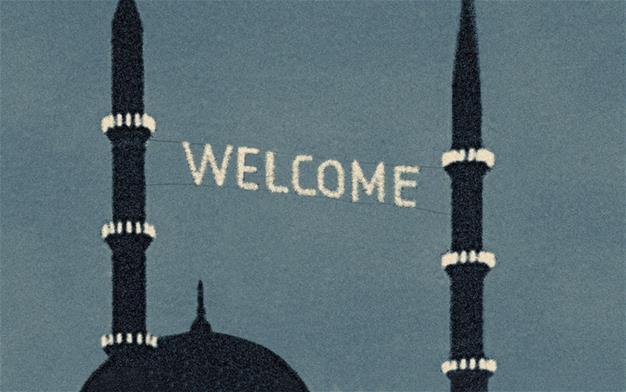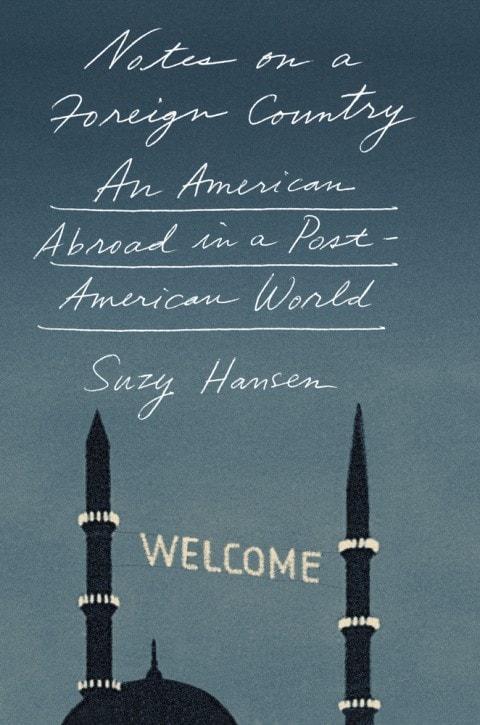An American abroad in a post-American world
William Armstrong - william.armstrong@hdn.com.tr
 ‘Notes on a Foreign Country: An American Abroad in a Post-American World’ by Suzy Hansen (Farrar, Straus and Giroux, 277 pages, $26)
‘Notes on a Foreign Country: An American Abroad in a Post-American World’ by Suzy Hansen (Farrar, Straus and Giroux, 277 pages, $26)Suzy Hansen first came to Turkey on a research fellowship in 2007 at the age of 29. Since then she has reported for the New York Times magazine and others, covering Syrian refugees in suburban Istanbul, the deadly Soma industrial disaster, the Erdoğan-Gülen bust up, and the post-coup attempt crackdown. Over that time she has built a reputation as one of the most sophisticated and sensitive reporters on Turkey.
She has also spent much of the time worrying about America’s heavy footprint around the world. As described in “Notes on a Foreign Country,” when Hansen first came to Turkey she still believed there was an “inherent goodness” to the U.S. “Deep in my consciousness I thought that America was at the end of some evolutionary spectrum of civilization, and everyone else was trying to catch up.”
 The book chronicles a steady loss of this innocence. Hansen reflects on her experiences reporting from Turkey and elsewhere. “My years as an American abroad in the 21st century were not a joyous romp or self-discovery and romance, the kind we see in movies; mine were more of a shattering and a shame,” she writes. “Once you realize that they way you have looked at the world – the way you viewed your country, your history, your life – has been muddled, you begin a process of shedding layers of skin.”
The book chronicles a steady loss of this innocence. Hansen reflects on her experiences reporting from Turkey and elsewhere. “My years as an American abroad in the 21st century were not a joyous romp or self-discovery and romance, the kind we see in movies; mine were more of a shattering and a shame,” she writes. “Once you realize that they way you have looked at the world – the way you viewed your country, your history, your life – has been muddled, you begin a process of shedding layers of skin.”
Touted as a book “about an American living abroad in the era of American decline,” it appears when many are horrified at the spectacle of the Donald Trump presidency. But Hansen’s focus is deeper, addressing U.S. amnesia that goes back decades. Like the subjects of all empires that have come before, “Americans sought in the delusions of empire proof of their own exceptional traits and strength,” she writes. Many of them know little of Washington’s all-too-common betrayal of its professed values in countries like Turkey.
One of the muses Hansen refers to throughout the book is James Baldwin, who lived in Istanbul for 10 years around the 1960s. It may seem odd for a black, gay American writer to spend the civil rights era living on the shores of the Bosphorus. But from Istanbul Baldwin acquired a unique perspective on his compatriots’ “lack of a sense of tragedy” and “the country’s terrible innocence about its own deeds.” This innocence strikes a chord with Hansen. She suggests that it is “perhaps an ethical duty, as a human being, and as an American, to consider that our American dreams may have come at the expense of a million other destinies.”
The book is full of sharp observations about Turkey, which will have many familiar with the country nodding along. “Turkish hospitality was not obsequious; to the contrary, they were the ones in control,” Hansen writes at one point. “Istanbul, in some heavenly seeming economic phase between the old world and early capitalism, still had shops that only did one thing: sell eggs, bake simit, or make künefe,” she writes at another. On Turkey’s history, she says it is “virtually impenetrable at first to an outsider; a double helix of twists and turns, phases and stages, revolutions and themes of other countries.”
Hansen’s self-awareness is also reflected back. She wonders why she never made the same inquiries into the U.S. as she does into Turkey: “I judged the Turks; every time I read of another massacre, another disgrace, I somehow brought it to bear on the collective character of the people I was meeting, as if that history had formed them. But then what of mine, and what of me?” She sometimes flips between convictions within the space of a paragraph. “What was enlightenment, what was liberalism?” she asks. “What power did journalists have? How often did we hurt the very people we claimed to represent with our own muddled vision of the world, of America, of ourselves?” Uncovering the long list of U.S. misdeeds, Hansen wonders whether “everything we believed about ourselves is false.”
In blasting U.S. malfeasance, Hansen is too sweeping. The book gives the sense that there are no problems in the world that are not the Americans’ fault. Certainly, as global hegemon the U.S. has committed many crimes. But you don’t have to be a flag-waving American nationalist to recognize that the U.S. has also done some good. It has led the illegal invasion of Iraq, helped humiliate the Palestinians, destabilized Libya, and caused suffering and unintended consequences with its anti-Soviet Cold War policy. But it also kept Europe peaceful after saving it in World War II, provided an ideal (if not reality) that inspired around the world, fought disease in Africa, and pioneered many scientific and technological advances. The record is distinctly mixed.
But “Notes on a Foreign Country” remains an eloquent, stimulating book that deserves a wide readership. It is also well-timed – articulating U.S. fatigue at a time when the country’s imperial star is in decline.
* Follow the Turkey Book Talk podcast via iTunes here, Stitcher here, Podbean here, or Facebook here, or Twitter here.
She has also spent much of the time worrying about America’s heavy footprint around the world. As described in “Notes on a Foreign Country,” when Hansen first came to Turkey she still believed there was an “inherent goodness” to the U.S. “Deep in my consciousness I thought that America was at the end of some evolutionary spectrum of civilization, and everyone else was trying to catch up.”
 The book chronicles a steady loss of this innocence. Hansen reflects on her experiences reporting from Turkey and elsewhere. “My years as an American abroad in the 21st century were not a joyous romp or self-discovery and romance, the kind we see in movies; mine were more of a shattering and a shame,” she writes. “Once you realize that they way you have looked at the world – the way you viewed your country, your history, your life – has been muddled, you begin a process of shedding layers of skin.”
The book chronicles a steady loss of this innocence. Hansen reflects on her experiences reporting from Turkey and elsewhere. “My years as an American abroad in the 21st century were not a joyous romp or self-discovery and romance, the kind we see in movies; mine were more of a shattering and a shame,” she writes. “Once you realize that they way you have looked at the world – the way you viewed your country, your history, your life – has been muddled, you begin a process of shedding layers of skin.”Touted as a book “about an American living abroad in the era of American decline,” it appears when many are horrified at the spectacle of the Donald Trump presidency. But Hansen’s focus is deeper, addressing U.S. amnesia that goes back decades. Like the subjects of all empires that have come before, “Americans sought in the delusions of empire proof of their own exceptional traits and strength,” she writes. Many of them know little of Washington’s all-too-common betrayal of its professed values in countries like Turkey.
One of the muses Hansen refers to throughout the book is James Baldwin, who lived in Istanbul for 10 years around the 1960s. It may seem odd for a black, gay American writer to spend the civil rights era living on the shores of the Bosphorus. But from Istanbul Baldwin acquired a unique perspective on his compatriots’ “lack of a sense of tragedy” and “the country’s terrible innocence about its own deeds.” This innocence strikes a chord with Hansen. She suggests that it is “perhaps an ethical duty, as a human being, and as an American, to consider that our American dreams may have come at the expense of a million other destinies.”
The book is full of sharp observations about Turkey, which will have many familiar with the country nodding along. “Turkish hospitality was not obsequious; to the contrary, they were the ones in control,” Hansen writes at one point. “Istanbul, in some heavenly seeming economic phase between the old world and early capitalism, still had shops that only did one thing: sell eggs, bake simit, or make künefe,” she writes at another. On Turkey’s history, she says it is “virtually impenetrable at first to an outsider; a double helix of twists and turns, phases and stages, revolutions and themes of other countries.”
Hansen’s self-awareness is also reflected back. She wonders why she never made the same inquiries into the U.S. as she does into Turkey: “I judged the Turks; every time I read of another massacre, another disgrace, I somehow brought it to bear on the collective character of the people I was meeting, as if that history had formed them. But then what of mine, and what of me?” She sometimes flips between convictions within the space of a paragraph. “What was enlightenment, what was liberalism?” she asks. “What power did journalists have? How often did we hurt the very people we claimed to represent with our own muddled vision of the world, of America, of ourselves?” Uncovering the long list of U.S. misdeeds, Hansen wonders whether “everything we believed about ourselves is false.”
In blasting U.S. malfeasance, Hansen is too sweeping. The book gives the sense that there are no problems in the world that are not the Americans’ fault. Certainly, as global hegemon the U.S. has committed many crimes. But you don’t have to be a flag-waving American nationalist to recognize that the U.S. has also done some good. It has led the illegal invasion of Iraq, helped humiliate the Palestinians, destabilized Libya, and caused suffering and unintended consequences with its anti-Soviet Cold War policy. But it also kept Europe peaceful after saving it in World War II, provided an ideal (if not reality) that inspired around the world, fought disease in Africa, and pioneered many scientific and technological advances. The record is distinctly mixed.
But “Notes on a Foreign Country” remains an eloquent, stimulating book that deserves a wide readership. It is also well-timed – articulating U.S. fatigue at a time when the country’s imperial star is in decline.
* Follow the Turkey Book Talk podcast via iTunes here, Stitcher here, Podbean here, or Facebook here, or Twitter here.










